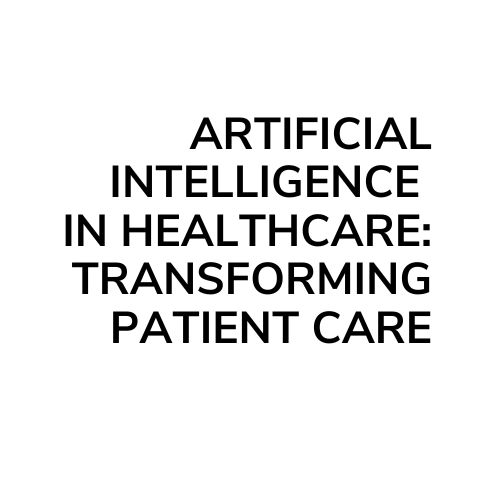Artificial Intelligence in Healthcare: Transforming Patient Care

Artificial Intelligence (AI) has made significant strides in transforming patient care within the healthcare industry. Its applications span various aspects of healthcare delivery, from diagnostics to personalized treatment plans and administrative tasks. Here are some key ways AI is revolutionizing patient care:
- Medical Imaging and Diagnostics: AI-powered algorithms can analyze medical images (like X-rays, MRIs, CT scans) with remarkable accuracy, aiding in early detection and diagnosis of diseases such as cancer, tuberculosis, and more. AI can assist radiologists by highlighting potential areas of concern, leading to quicker and more precise diagnoses.
- Personalized Medicine: AI helps in analyzing vast amounts of patient data to create personalized treatment plans. By considering individual genetic makeup, lifestyle factors, and medical history, AI can suggest tailored therapies and medications that may be more effective for specific patients.
- Predictive Analytics: AI algorithms can predict patient outcomes and potential complications by analyzing patient data, vital signs, and other health indicators. This proactive approach enables healthcare providers to intervene earlier, thereby preventing avoidable hospitalizations and improving patient outcomes.
- Drug Discovery and Development: AI accelerates the drug discovery process by analyzing molecular structures, predicting potential drug interactions, and identifying promising compounds more efficiently. This can significantly reduce the time and cost required to bring new drugs to market.
- Virtual Health Assistants: AI-powered chatbots and virtual health assistants provide immediate and personalized responses to patient inquiries, offer healthcare advice, schedule appointments, and remind patients about medication and follow-up appointments, improving patient engagement and adherence to treatment plans.
- Administrative Efficiency: AI streamlines administrative tasks such as scheduling, billing, and managing electronic health records (EHRs). Natural Language Processing (NLP) enables AI to extract and analyze information from clinical notes, reducing the administrative burden on healthcare professionals.
- Remote Monitoring and Telemedicine: AI facilitates remote patient monitoring through wearable devices and sensors, collecting real-time health data. This enables healthcare providers to monitor patients outside traditional healthcare settings, leading to timely interventions and reduced hospital visits.
- Ethical and Regulatory Considerations: Implementing AI in healthcare requires addressing ethical concerns surrounding data privacy, algorithm transparency, and maintaining patient confidentiality. Regulatory bodies are continually adapting guidelines to ensure the responsible and ethical use of AI in healthcare.
While AI offers tremendous potential to transform patient care, its integration requires collaboration among healthcare professionals, data scientists, policymakers, and technology experts to ensure its ethical implementation, data security, and successful adoption in the healthcare ecosystem.
Advantages Of Artificial Intelligence in Healthcare: Transforming Patient Care
The advantages of Artificial Intelligence (AI) in healthcare are extensive and transformative, playing a pivotal role in enhancing patient care in numerous ways:
- Faster and Accurate Diagnoses: AI algorithms can analyze vast amounts of medical data and imaging results with incredible speed and accuracy, aiding healthcare professionals in diagnosing diseases at earlier stages. This can lead to timely interventions and improved patient outcomes.
- Personalized Treatment Plans: AI-driven algorithms can process patient data, including genetic information and medical history, to generate personalized treatment plans. Tailored therapies are more effective, minimizing adverse reactions and optimizing treatment outcomes.
- Efficient Drug Discovery: AI expedites drug discovery by analyzing molecular structures, predicting drug interactions, and identifying potential candidates for new drugs. This can significantly reduce the time and cost involved in bringing new medications to market.
- Remote Monitoring and Telemedicine: AI enables remote patient monitoring through wearable devices and sensors, allowing healthcare providers to track patient health data in real-time. This facilitates timely interventions, reduces hospital visits, and improves chronic disease management.
- Improved Administrative Efficiency: AI automates administrative tasks, such as scheduling appointments, managing electronic health records (EHRs), and billing. This streamlines operations, reduces errors, and allows healthcare staff to focus more on patient care.
- Enhanced Patient Engagement: AI-powered virtual health assistants and chatbots offer round-the-clock support, answering patient queries, providing health advice, and improving patient engagement. This leads to better adherence to treatment plans and increased patient satisfaction.
- Predictive Analytics for Better Outcomes: AI analyzes patient data to predict potential health issues and complications. This proactive approach helps healthcare providers intervene earlier, prevent adverse events, and improve overall patient outcomes.
- Support for Healthcare Professionals: AI tools assist healthcare professionals by providing decision support systems based on the latest medical literature and patient data. This aids in making more informed clinical decisions.
- Reduced Healthcare Costs: AI implementation can potentially reduce healthcare costs by optimizing resource allocation, preventing avoidable hospital admissions, and minimizing medical errors through improved diagnostics and treatment planning.
- Ethical Advancements: AI in healthcare also prompts discussions on ethical considerations and regulatory frameworks, fostering a deeper understanding of data privacy, security, and responsible use of patient information.
AI has the potential to revolutionize patient care by offering innovative solutions that complement and enhance the capabilities of healthcare providers, leading to more efficient, effective, and personalized healthcare delivery.
Quantum Computing: The Next Frontier in Technology
Disadvantages Of Artificial Intelligence in Healthcare: Transforming Patient Care
While Artificial Intelligence (AI) offers numerous advantages in healthcare, its integration also poses certain challenges and disadvantages:
- Data Privacy and Security Concerns: AI systems require access to large volumes of sensitive patient data. Ensuring the security and privacy of this data is crucial to prevent breaches and unauthorized access, raising concerns about data protection and patient confidentiality.
- Reliability and Accuracy: AI algorithms heavily rely on the quality and quantity of data they are trained on. Biases or inaccuracies in the training data can lead to erroneous results or misinterpretations, potentially affecting patient diagnoses or treatment recommendations.
- Ethical Challenges: The use of AI in healthcare raises ethical dilemmas, such as ensuring fairness in treatment recommendations, transparency in algorithm decision-making, and addressing the potential consequences of overreliance on AI-driven decisions without human oversight.
- Integration and Adoption: Implementing AI systems into existing healthcare infrastructures can be complex and costly. Resistance to change from healthcare professionals and patients, coupled with interoperability issues among different systems, can hinder seamless integration and adoption.
- Lack of Regulation and Standards: The rapidly evolving nature of AI technology often outpaces regulatory frameworks and standards. This can result in uncertainty regarding liability, accountability, and appropriate regulation of AI-based healthcare applications.
- Loss of Human Connection: While AI enhances efficiency, it may lead to reduced direct interactions between healthcare providers and patients. Maintaining a balance between technological advancements and preserving the human touch in healthcare becomes essential for patient-centered care.
- Job Displacement Concerns: There are concerns about AI’s potential to automate certain tasks traditionally performed by healthcare professionals. This could lead to workforce displacement or require reskilling healthcare workers to adapt to new roles alongside AI.
- Algorithm Bias and Interpretability: AI algorithms can inherit biases present in the data used for their training, leading to disparities in care or recommendations across different demographic groups. Additionally, the complex nature of some AI models makes it challenging to understand their decision-making process, affecting trust and acceptance.
- Dependency and Overreliance: Over-reliance on AI-driven insights without critical assessment or human validation can lead to complacency among healthcare professionals, potentially compromising patient safety and care quality.
- Cost and Resource Allocation: While AI has the potential to optimize resource allocation, initial implementation costs and the need for ongoing maintenance and updates can strain healthcare budgets, particularly in underfunded systems or regions.
Addressing these disadvantages requires a concerted effort from healthcare organizations, policymakers, technology developers, and regulatory bodies to develop robust guidelines, ensure transparency, address biases, and prioritize ethical considerations in AI-powered healthcare solutions.
Tools of Artificial Intelligence in Healthcare: Transforming Patient Care
Artificial Intelligence (AI) is deployed in healthcare through various tools and technologies that revolutionize patient care. Here are some prominent AI tools transforming healthcare:
- Machine Learning Algorithms: These algorithms analyze large datasets to recognize patterns and make predictions. In healthcare, they assist in diagnosing diseases, predicting patient outcomes, and personalizing treatment plans based on individual patient data.
- Natural Language Processing (NLP): NLP enables machines to understand and interpret human language. It is used to analyze unstructured data such as clinical notes, medical literature, and patient records to extract valuable information, aiding in decision-making and improving documentation.
- Medical Imaging Analysis: AI-powered tools for medical imaging interpretation analyze images from MRI, CT scans, X-rays, and other modalities. These tools can detect anomalies, assist radiologists in diagnosis, and improve accuracy in identifying diseases at an early stage.
- Healthcare Chatbots and Virtual Assistants: AI-driven chatbots and virtual assistants provide 24/7 support, answer patient queries, schedule appointments, offer medication reminders, and deliver personalized health advice. They enhance patient engagement and streamline administrative tasks.
- Predictive Analytics: AI-based predictive models use patient data to forecast potential health risks, predict disease progression, and identify patients at higher risk of specific conditions. This facilitates proactive interventions and preventive care strategies.
- Robotic Surgery and Assistance: AI-powered robots assist surgeons during minimally invasive surgeries, providing precision and enhancing surgical capabilities. These robots can perform procedures with higher accuracy, reducing risks and recovery times for patients.
- Remote Monitoring Devices: Wearable devices equipped with AI monitor patients’ health data in real-time, collecting information such as heart rate, blood pressure, and glucose levels. This enables continuous remote monitoring and timely interventions, especially for chronic disease management.
- Drug Discovery and Development Tools: AI algorithms aid in analyzing vast amounts of molecular data to predict drug interactions, identify potential drug candidates, and streamline the drug discovery process. This accelerates the development of new medications and treatments.
- Clinical Decision Support Systems (CDSS): CDSS use AI to provide healthcare professionals with evidence-based recommendations and insights at the point of care. These systems help in diagnosing conditions, choosing appropriate treatments, and avoiding medical errors.
- Electronic Health Record (EHR) Management: AI enhances EHR systems by improving data organization, enabling predictive analytics, and assisting in data-driven decision-making for healthcare providers.
These AI tools are continuously evolving and being integrated into healthcare systems, contributing to more efficient, accurate, and personalized patient care while optimizing resource utilization and improving healthcare outcomes.
4 Ways Artificial Intelligence is Transforming Healthcare
DHAMAAD
Hadii aad intaan soo gartay waad guulesatay, waxaan ku rajayna inaa maqaalkan/ article kan wax ka faidi doontid illah idinkiis, waxii su’aalo ah qeybta comment no ku reeb ama tobic aad jaceshahay inaa kaso hadalno Insha allah. THANK YOU YOUR VISIT.





